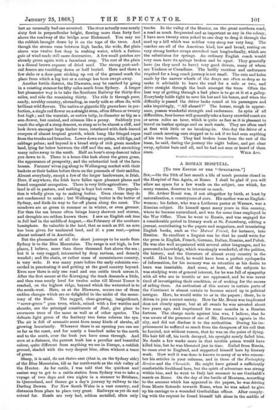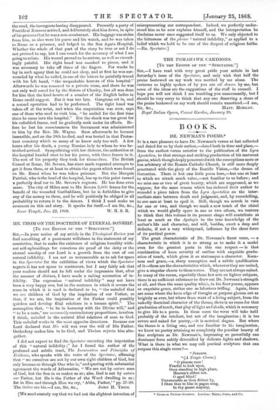A ROMAN HOSPITAL.
[To THE EDITOR OF THE " SPECTATOR."] SIR,—On the 28th of last month a life of much promise closed in the Hospital of San Agata, at Rome. I shall be glad if you will allow me space for a few words on the subject, one which, for many reasons, deserves to interest us much.
Mr. Arthur Benni was, if not altogether by birth, at least by naturalization, a countryman of ours. His mother was an English- woman; his father, who was a Lutheran pastor at Warsaw, was a Russian subject. He himself spent many years in this country, where he became naturalized, and was for some time employed in the War Office. Then he went to Russia, and was engaged for a considerable period in literary work at St. Petersburg, editing a journal, contributing to the papers and magazines, and translating English books, such as Our Mutual Friend, for instance, into Russian. So excellent a linguist was he that he could write for the press in English, French, German, Italian, Russian, and Polish. He was also well acquainted with several other languages, and be possessed a knowledge, which was simply wonderful, of the politics, the history, and the literature of almost every country in the world. Had he lived, he would have been a perfect cyclopmdia of information, for his memory was as retentive as his desire to learn was insatiable. And some, at least, of the subjects he was studying were of general interest, for he was full of sympathy with all who are in trouble or are oppressed, and he was never tired of investigating their condition, or of seeking for the means of aiding them. An enthusiast of this nature in certain parts of the Continent is almost certain to become mixed up in political intrigue. Here, he would write to or in the papers ; there, he is driven to join a secret society. How far Mr. Benni was implicated does not clearly appear, but at all events he was arrested about two years ago, and imprisoned for some months in a Russian fortress. The charge made against him was, I believe, that he was aware of the presence of one of Mr. Hertzen's agents in the city, and did not disclose it to the authorities. During his im- prisonment he suffered so much from the dampness of his cell that he fancied, not without reason, that he was on the point of dying. His hair fell off, his teeth decayed, his eyesight nearly failed him. No doubt a few weeks more in that terrible prison would have killed him, but he was liberated just in time. Exiled from Russia, he came over to England, and supported himself here by literary work. How well it was done is known to many of us who remem- ber his articles in your columns, and in those of the Fortnightly Review and the Chronicle. He might have gained a sufficiently comfortable livelihood here, but the spirit of adventure was strong within him, and he went to Italy last summer to see Garibaldi's march on Rome. On the day of the battle of Mentana, according to the account which has appeared in the papers, he was driving from Monte Rotondo towards Rome, when he was asked to give up his carriage to a wounded Garibaldian officer. After comply- ing with the request he found himself left alone in the middle of the road, the insurgents having disappeared. Presently a party of Pontifical Zonares arrived, and deliberately shot him down, in spite of his protests that he was a non-combatant. His baggage was stolen from him, as also were his purse and his watch, and he was taken to Rome as a prisoner, and lodged in the San Agata Hospital. Whether the whole of that part of the story be true or not I do not pretend to say, but I can vouch for the accuracy of what I am going to relate. His wound proved to be serious, as well as exceed- ingly painful. His right hand was smashed to pieces, and it was necessary to take off three of the fingers. For weeks he lay in such agony that he could not sleep, and at first he was sur- rounded by what he called, in one of the letters he painfully traced with his left hand, " the unspeakable horrors of this hospital." Afterwards he was removed to a private room, and there he was not only well cared for by the Sisters of Charity, but all was done for him that the kind hearts of a number of the English ladies in Rome could suggest. But it was too late. Gangrene set in, and a second operation had to be performed. The right hand was taken off at the wrist, and when the amputation was over, says one of those who used to visit him, "he smiled for the first time since he came into the hospital." But the shock was too great for his enfeebled frame, and he gradually sank under its effects. Be- fore he lost his consciousness the Sacrament was administered to him by the Rev. Mr. Wayne. Soon afterwards he became insensible, and on the 28th he died, and was buried in that Protes- tant cemetery which so many of us know only too well. A few hours after his death, a young Russian lady to whom he was be- trothed arrived. Sympathizing with her distress, the authorities at the hospital handed over to her his purse, with three francs in it. The rest of his property they took for themselves. The British Consul at Rome, Mr. Severn, has since made repeated attempts to get it from them, or at least to obtain the papers which were found on Mr. Benni when he was taken prisoner. But the Marquis Patrizzi, who is the head of the hospital, has up to this point turned a perfectly deaf ear to Mr. Severn's requests. He has done even more. The city of Milan sent to Mr. Severn 3,000 francs for the benefit of the wounded Garibaldians, but he is forbidden to give any of the money to them, and he will positively be obliged in all probability to return it to the donors. I think I need make no comment on this sad story. It speaks for itself.—I am Sir, &c.,































 Previous page
Previous page